
27 minute read
WHEN ALBANIAN MIGRANT SHIPS TUGGED MALTA’S HEART
Twenty-eight years after ships loaded with desperate Albanians docked in Malta, those seeking refuge and those that helped them remember how their stopover led to a remarkable outpouring of solidarity.
On the evening of August 8, 1991 Daphne CaruanaGalizia – then a young reporter for the Sunday Times of Malta, stood at Saint Paul’s Bay, listening to the radio chatter between two Albanian ships, the Durresi and Lirija, and the Maltese authorities.
Advertisement
Earlier that day, the ships had arrived in Malta from the port of Vlora in southern Albania with hundreds of people on board. Many were young men desperate to escape the economic hardship of what was then the most isolated country in Europe – regularly compared to North Korea.
The late reporter –who became an anti-corruption icon after she was killed by a car bomb in 2017 – documented “the human face of tragedy” by speaking to a group mostly of teenagers – some of whom had jumped ship and were now housed in a primary school awaiting repatriation.
“Looking at these photographs after so many years, it certainly provokes emo tions,” recalls NdricimBaci, who was then 22 and had left for Malta with his 15-yearold brother, Avni.
“Twenty-eight years have passed but I still remember those dramatic moments,” adds Baci, who together with his family now lives and works in Italy.
After three days on the island, the migrants were repatriated under an agreement between the Maltese authorities and Albania’s then foreign minister, MuhametKapllani, with the promise that the returnees would not be harmed or persecuted.
Many Maltese people, CaruanaGalizia among them, disagreed with the decision to turn back the Albanian migrants. In a later commentary in the Sunday Times, she argued that they should have been offered political asylum.
But their plight hit home, and a nucleus of volunteers launched an effort to gather food and clothes to ship to Albania.
Following an appeal by Mother Teresa – the ethnic Albanian nun now honoured as Saint Teresa of Calcutta, assistance was al so provided through several institutions of the Catholic Church and the island slowly embarked on its first overseas development effort.
“Albania became a country that the Maltese would adopt,” explains Claudia Taylor East, executive director of SOS Malta, an organisation set up to deliver aid and run projects in Albania. BESAR LIKMETA | BIRN | TIRANË
Irena Laska, executive director of the Mary Potter Palliative Care Center in the city of Korca. Photo: Besar Likmeta
Exodus on a biblical scale: Albania’s communist regime was the last dictatorship to crumble in Eastern Europe after the fall of the Berlin Wall. Its implosion was precipitated in 1991 by a massive exo dus of refugees to the West on ships seized in ports by crowds of young people desperate to leave a country that was an economic ruin.
A report prepared in 1992 by the Parliamentary Assembly of the Council of Europe noted that in March 1991, tens thousands of Albanians had seized ships in the ports of Durres and Vlora, arriving later on Italian shores.
Another flow of migrants was registered on August 8, 1991, when an estimated 10,000 Albanian nationals on board several ships forced their way into the port of Bari in southeast Italy. Another 1,000 reached the port of Otranto. Two other ships that tried unsuccessfully to land in Sicily were diverted to Malta and later re turned to Albania.
Baci, who then worked as truck driver in Vlora, together with his 15-year-old brother, was on board the Durresi, which, together with the Lirija, sailed from Vlora toward Malta.
He recalls that when they left port, peo ple on board feared being attacked or forced to turn back by the Albanian navy speedboats in the Otranto Channel. They only breathed a sigh of relief once they cleared the island of Sazan.
Following the March exodus, Italy closed its ports and many feared that the Italian government would deny them entry. Baci says the ship was well stocked with food, and, as they watched Italian television on board, debate raged among the migrants about where to land. “In those days, many ships landed in the southern Italian port of Brindisi and the migrants were being repatriated,” Baci says. “Out of fear of being turned back, we took the decision to sail to Malta,” he adds.
Baci recalls that the people on the ship had little knowledge of the outside world and discussed many options before choosing Malta, including sailing to England or The Netherlands.
“At the time, we did not know much about Malta; I can’t recall who came up with it, but it was an option,” he said.
Despite the decision to sail to Malta, some the migrants still wanted to try their luck in Italy. When the ships passed close to Brindisi, some jumped overboard and swam the few miles to shore. Baci recalls that the current was pretty strong, so they used a strong light beaming from the top of a factory to orientate themselves.
Once the ships arrived in Saint Paul’s Bay in Malta – whose name refers to the shipwreck of the St Paul on his journey from Caesarea to Rome – they were sur rounded by the coast guard, which ordered them to leave Maltese waters.
“To scare us off, a sniper shot at the lights on the ship’s mast but we did not leave,” Baci recalls. “The ship’s captain talked to the port authorities, saying that he was being held hostage and had no intention of leaving,” he adds.
The ships dropped anchor in front of the port and later a police tugboat came and brought them some water. The next day, the Maltese authorities allowed the Albanians on land and sent them to a barracks where they were put under police guard. The following day, the migrants were notified they would be repatriated home.
“They gave us $20 each and sent us to the airport; there were 160 of us on the flight,” says Baci. “In Tirana, on the tarmac, a bus was waiting to drive us back to Vlora,” he concludes.
Plight provoked wave of sympathy: Although the Albanian migrants who ar rived in Malta that August were turned away, their plight provoked sympathy among the Maltese who started to raise funds to help with aid and development.
“When the boats came in 1991, Lilian and I thought we had to do something,” recalls Claudia Taylor East, who together with Dame LilianMiceliFarrugia, a former chairman of the Mother Teresa Co-Workers, founded SOS Albania.
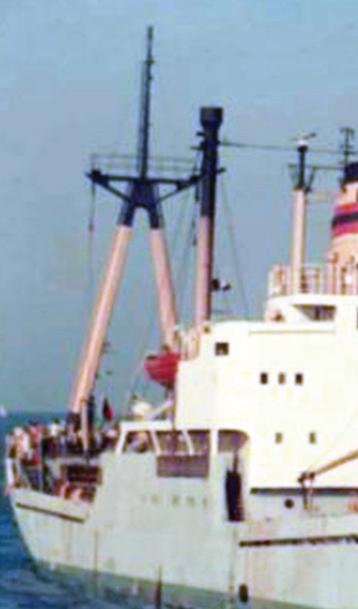
The Albanian ship ‘Durresi’ on Saint Paul’s Bay in Malta with migrants on board on 08.08.1991. Photo: Captain Lawrence Dalli
Taylor East notes that at the time LilianFarrugia worked with Mother Teresa, who in 1991 had set up a centre for people with disabilities in the industrial city of Elbasan in central Albania and made an appeal for aid.
“So, after the ships arrived in August, and after the government decided to repatriate all of the migrants, we made an appeal for help and that’s how SOS Albania was born,” Taylor East says.
In a short time, the charity gathered several containers of food and clothing, which were shipped to Albania and distributed among poor children.
“There were children then that did not have shoes and were running barefoot in the snow,” Taylor East says. “Mother Teresa was instrumental in the calls and appeals for help in Albania and she even visited our project and was delighted,” she adds.
After shipping dozens of containers with aid, SOS Albania moved to set up development projects. In early 1992, it made contacts in the city of Korca to set up a bakery whose profits would then finance a high school.
The bakery went out of business after a year, but the high school is still there. According to the headmaster, Carmel Camillieri, it is one of the best in the country. It was set up with the help of the Society of Christian Doctrine in 1996 and is named after its founder, George Preca.
However, only one year later, in 1997, the college was ransacked during a period of anarchy and lawlessness following the collapse of a series of pyramid-like investments schemes in Albania.
Its backers had to start from scratch. Since then, 1,063 students have graduated and every year it welcomes up to 75 new pupils divided into three classrooms. “Thank God we are among the best schools in the country, in the top five,” says Camillieri, who notes that half of the first class of graduates in 1997 went on to college in the Unites States.
Can Europe help the Balkans keep its young emigrants?
High emigration rates are doing massive damage to the prospects of the Western Balkans — and one question is whether a stronger EU perspective can reverse this outflow.
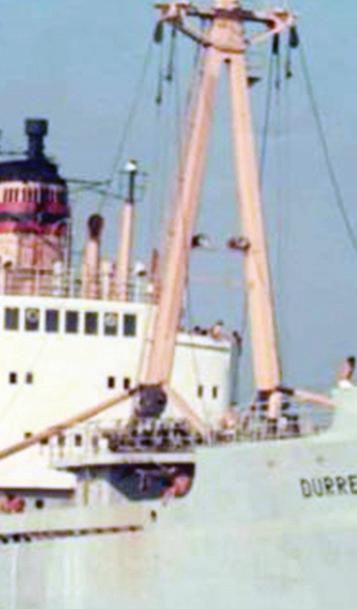
“They have been successful in the United States; one is a professor in the Boston area, another is an assistant professor and a former student is a scientist and works with NASA,” he adds with pride.
Like all the members of the Society of Christian Doctrine, Camillieri has dedicated his life to the society, which counts many teachers among its members. That is why SOS Albania enlisted their help to help run the school.
Another important project in the region of Korca, where the charity has been involved, is the Mary Potter Palliative Care Centre, which contributes to improving the quality of care for cancer patients.
Originally set up by the Little Company of Mary Sisters, the centre was completely destroyed during the chaotic riots of 1997 and SOS Malta’s help was critical for its reconstruction.
“In 1999, this centre started working again, hosting refugees from Kosovo, par ticularly those in need of end-of-life care,” says executive director Irena Laska.
According to Laska, SOS Malta helped with the furnishings and brought trailers full of aid for the Kosovo refugees. “With the help of SOS Malta, the ‘Mary Potter’ sisters were able to reopen the centre,” she added.
Today, the sisters have left and the centre is run as a non-profit charity by local Albanian doctors and nurses who provide end-of-life care for 400 cancer patients every year. “This centre is not only special but unique, as the only residential palliative care centre in Albania,” Laska says. “I believe we have built a positive model,” she adds.
Following the Kosovo refuge crisis, SOS Albania transformed itself into SOS Malta, which is now involved in many overseas development projects from Sri Lanka to Myanmar.
Reminiscing on the organisation’s be ginnings and on CaruanaGalizia’s coverage of the migrant ships, Taylor East notes that the late reporter was a big supporter of the charity.
“Daphne was extremely sensitive to the needs of people,” she says. “She had a heart that was in the right place,” she concludes.
ALIDA VRACIC | BIRN | SARAJEVO
At a high-level gathering in Bled, Slovenia, Nikola Dimitrov, North Macedonia’s Foreign Minister, recently expressed the hope that his country’s EU accession talks will start in October. He also pointed out that a start to accession talks would help persuade young people not to emigrate and seek a “European lifestyle” elsewhere.
This was a rare occasion when a top politician from the Western Balkans addressed emigration as an issue, and expressed hope that the trend could be halted with the right decisions and with the prospects of joining the EU.
A big question, however, is whether opening EU accession talks, or even eventual membership, will actually persuade young and skilled women and men to stay in the region.
The answer gets more complicated when the Western Balkan six — Albania, Bosnia, Kosovo, Montenegro, North Macedonia, and Serbia — are compared with neighbouring Croatia.
There, emigration rates have skyrocketed since — and despite — EU membership in 2013. Many Croats hoped that EU accession would provide enough incentives for people to stay in Croatia, but this did not happen.
So, can a little EU magic help? To most observers of the region, the situation looks grim in terms of emigration. The latest Eurostat figures say around 230,000 people left the region in the past year. The largest number emigrated from Albania — 62,000. This was followed by Bosnia and Herzegovina (53,500), Serbia (51,000), Kosovo (34,500), North Macedonia (24,300) and Montenegro (3,000).
Gallup research has meanwhile shown that about 46 per cent of people in Serbia aged 15 to 29 want to leave with no intention of returning. Twenty-seven per cent of those with higher education expressed a wish to leave permanently.
This comes at a cost to their countries.
According to a Westminster Foundation report from 2019, with four out of five young Serbs thinking about emigrating, this human outflow could potentially cost Serbia up to 1.2 billion euros per year.
No country in the region can afford this — but it is happening.
The situation is similar in other countries in the region and these numbers should impress on everyone a sense of urgency. Compared with the economies of Western Europe, the countries of the region have little to offer. The six Western Balkan countries are still among the poorest in Europe and their pace of convergence with European standards is slow. Most of the local political elites ap- “Skenderbeg” square in Tirana. Photo: Ivana Dervishi
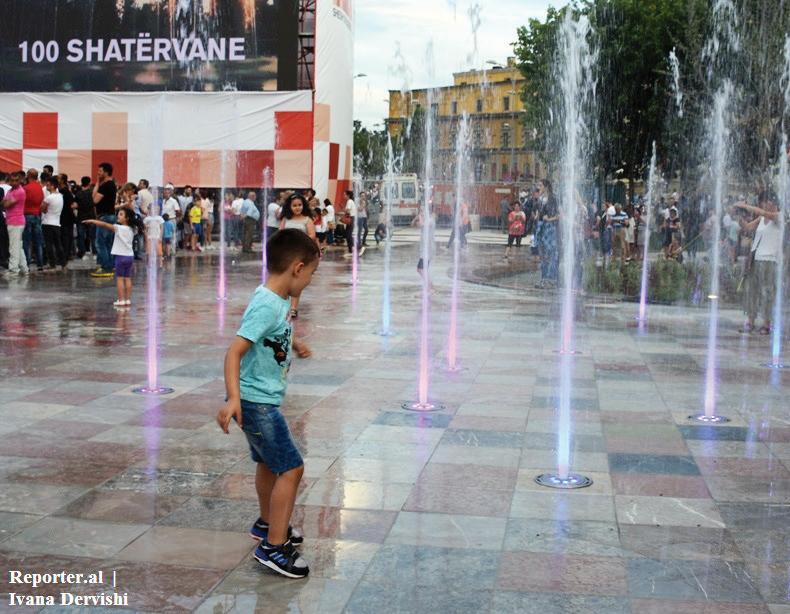
pear more focused on personal gains and private business interests than on the public good. Well-paid jobs are scarce.
In 2018, 1.15 million people in the region were unemployed. While this was less than a year ago, the decline in Bosnia and Herzegovina and Kosovo was largely driven by higher inactivity and likely emigration, which reduced the labour force’s participation rate.
In the words of the latest 2019 World Bank report on the Western Balkans: “If left unaddressed, human capital challenges will severely limit the prospects for growth and poverty reduction.” ‘More Europe’? Not everyone leaves for purely economic reasons. Many are reportedly leaving because of the “toxic” atmosphere and overwhelming lack of perspective.
“More Europe” in the Western Balkans could possibly shift the gears. While disillusioned by decades of empty promises from their local elites, the citizens of the region still share a vision of the longterm prospect of EU membership.
In all six countries, they are more likely to say membership would benefit rather than harm their countries. At least four out of five residents say EU membership would benefit their country or region.
For many of them, the EU accession process comes in different shapes and forms. Citizens of the region associate membership with improved living standards, job growth, better education, cleaner streets, proper garbage collection and a more civilised and decent political discourse. They associate it with better everyday lives.
So far, however, Europe’s efforts to translate its transformative powers onto the ground and among people have not created a momentous change — either in terms of processes or policy. Moreover, citizens remain largely absent from the political discourse in their countries.
As for the EU, enlargement has not even been on the agenda for years. The lack of appetite for enlargement among the principal countries of the EU, to no one’s surprise, has led an increasing num ber of people in the Western Balkans to believe that their region will never become part of the EU.
In response, they choose to emigrate — to the EU.
Can the current messaging from Brussels provide some hope?
In the words of Ursula von der Leyen, now the first female President of the European Commission: “The Western Balkans is very important for the European Union. It’s Europe. And therefore I will support as much as possible the growing relationship between the Western Balkan countries and the European Union.”
Von der Leyen formally takes the helm of the EU’s executive on October 31 — the day Britain is due to leave the bloc.
How much Europe the new Commission will bring to the Western Balkans region will almost certainly determine the destinies of many who are thinking of emigrating.
As the Western Balkans has witnessed many times, a lack of convincing narratives presented by open, honest and committed individuals results in failure, whereas competent, energetic and committed personalities may bring about much-needed breakthroughs.
Thoughtful consideration of who will lead the enlargement process is of extreme importance. The EU’s most powerful tools have limits. From benchmarking and monitoring to technical assistance and pre-accessional fund, success in the Western Balkans will require profound modifications.
Much is at stake, and not only for the Western Balkans.
Unless there are significant improvements soon, the Western Balkans region will almost certainly suffer severe demographic challenges. Emigration en masse will cause major labour and expert shortages. This will have immediate and longterm consequences.
But the greatest cost of all will be having to assist deserted countries — whose best and brightest have long gone.
The tough line the Netherlands took last week on enlargement is defensible – but it must be accompanied by a better understanding of how crucial the process is for aspiring countries.
Opinion
‘Strict – but Fair?’: Dutch Approach to EU Enlargement
WOUTER ZWEERS | BIRN |
Last week the hopes of many citizens in North Macedonia and Albania were shattered when the European Council proved unable to decide on opening EU accession negotiations.
Condemned by the vast majority of European leaders as a “historic error”, in two EU member states the outcome was met almost awkwardly quietly: France and The Netherlands.
Their critical positions in the debate – France blocked both countries, while the Netherlands blocked only Albania – seems hardly explainable if one takes at face value the joint letter published before the European Council meeting by Council President Donald Tusk, Parliament President David Sassoli, Commission President Jean-Claude Juncker and President-elect Ursula Von Der Leyen.
Didn’t both North Macedonia and Albania, as they hold, do “what we asked them to do”?
No, is the answer, according to the Netherlands, at least when it comes to Albania. While most of the blame was placed on French President Emmanuel Macron, the question arises why the position of the Netherlands differs from the overwhelming majority of other member states.
The formal Dutch government approach towards EU enlargement is marked by the increasingly infamous motto, “Strict but fair”. “Strict” means that the conditions for accession are not up for compromise, so everything needs to be in order before countries can join the EU. “Fair” means that once conditions are met, membership is on the table, and that the Netherlands actively supports difficult reform processes in the region.
So far, the formal approach, what about the practice? The Netherlands has diplomatic representations in all Western Balkans countries with the exception of Montenegro. All embassies host a rule-of-law coordinator fully dedicated to the issue. Through its Matra Fund, the Netherlands supports “current and potential EU candidate countries … to strengthen democracy and the rule of law, thus enhancing stability”.
Between 2017 and 2024, the fund totals 19 million euros. The Netherlands cannot therefore be labelled a disinterested observer in the Balkans, a qualification attributed to France in the region.
At the same time, The Netherlands tends to see the glass half-empty rather than half-full when it comes to assessing reforms. Part of
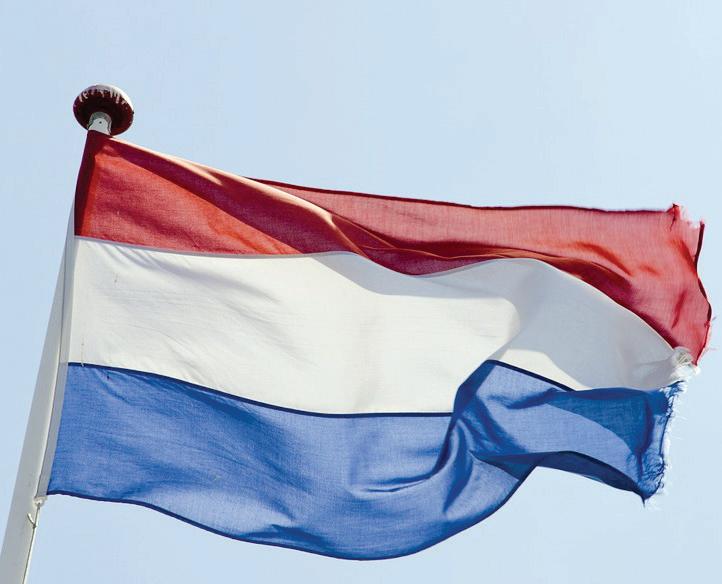
Dutch Flag. Photo:Wikimedia
this approach can be explained from the central question with which the country views enlargement: what kind of EU do we want to be part of?
The centrality of this question in the Dutch approach is not surprising given developments in the past decades. After the “big bang” of the 2004-2007 enlargement round, dynamics in the EU changed considerably. Romania has not shown much progress under the Cooperation and Verification Mechanism, CVM, while the rule of law, the independence of the judiciary and freedom of the media have deteriorated in several member states.
Combined with the fact that one of the Dutch major allies, the UK, is leaving, the kind of EU that the Netherlands wants to be part of seems further away than a decade ago.
This explains the tendency in the Netherlands to be lukewarm when it comes to a potential new enlargement round. But the approach also shows a kind of self-centeredness, as it is not the future of the Western Balkans countries but that of the EU that forms the main focus of the Dutch approach towards enlargement.
And shouldn’t the enlargement process be focussed on the development of sustainable democracies in the Western Balkan countries themselves?
It is a simplification to state that the Netherlands blocks opening negotiations only because it is simply unwilling, as has been argued in the public debate. But it is true that the Dutch parliament is predominantly against further EU integration – a position that reflects sentiments in Dutch society.
Parties on both the right and left of the spectrum have strong concerns about delegating more power to Brussels, for they fear that the EU becomes uncontrollable. EU enlargement is regarded in the same manner.
This has an effect on the Dutch government position, which is bound by parliamentary resolutions, such as the one adopted in June, that Albania should not be allowed to open accession negotiations.
Still, the debates in the Dutch parliament in the run-up to last week’s European Council were content-focused and revolved around the accession criteria instead of extraneous factors, such as was the case in France.
The fact that a similar resolution asking the government to not allow opening accession negotiations with North Macedonia was rejected shows that both countries were judged on their own merits.
For many commentators, one question remains hard to wrap one’s head around: How come the Netherlands reaches another conclusion on Albania than the European Commission? One explanation is that most Dutch politicians do not consider the European Commission a neutral actor – and maybe rightly so. The European Commission progress reports leave room for interpretation, stating that a country is only “moderately prepared” in a number of fields but simultaneously giving a positive recommendation when it comes to opening negotiations.
As such, while the analysis of progress in the reports is neutral, the conclusions – allegedly written in Brussels – reflect a political view. This is illustrated by the fact that when Macedonia was under Nikola Gruevski’s government, the European Commission continued to advise to open accession negotiations despite its strong backsliding in the democratisation process.
Perhaps, the decision to open accession negotiations at the end of the day is always of a political nature and never fully objective. But that means the European Commission’s conclusions cannot be taken at face value by member states who take a more critical stance on whether conditions have been met.
As JasminMujanovic argued in this outlet, “France’s dishonest refusal to state its real policy – that it doesn’t want any EU enlargement – is damaging the EU’s credibility, as well as the democratic prospects of the Balkans”. For The Netherlands, the picture seems more nuanced.It cannot be said that the Netherlands does not support a genuine enlargement policy. Its critical position has even been welcomed in the region, for example by North Macedonia’s Foreign Minister, Nikola Dimitrov, who earlier this year noted that he wanted his country “assessed on what we can do and for that assessment to be strict”.
The Dutch focus on formal conditions instead of compromising over extraneous factors is exactly that. Indeed, the EU and its member states should apply conditionality consistently and judge aspiring countries on their actual progress, not on emotions.
On the other hand, the Dutch government and parliament should accompany their critical positions with a better understanding of how crucial the process is for the aspiring countries.
A focus only on what kind of EU the Netherlands wants to be in, and not taking interest in the future of the Western Balkans itself, structurally undermines prospects in the region, which are closely connected to their European aspirations.
The road towards EU accession is not some side-agenda for North-Macedonia and Albania. It is key to the future of these countries. The Dutch government and parliamentarians can only legitimately take a critical stance if they form a more integral and informed view on the future of the Western Balkans, including on enlargement. Only then can The Netherlands rightfully defend its “strict but fair” approach.
Analysis
Some may wish the EU would simply honour its earlier commitment to integrate the Balkans region, but the time for wishful thinking has long passed.
EU ENLARGEMENT: THE BALKANS BREXIT FALLOUT
TIMOTHY LESS | BIRN | CAMBRIDGE
Today, European leaders will almost certainly again reject the request by Albania and North Macedonia to open negotiations on EU membership. In doing so, they will confirm what has been clear for a long time — that the process of enlargement is over, and that the Balkans are not going to join the EU.
In truth, key states in the EU, most notably France, never really wanted the EU to enlarge to the east, which confers disproportionate benefits to Germany, thereby upsetting the balance of power between Paris and Berlin while weakening the cohesion of the EU as a whole.
From France’s point of view, that undermines the whole point of European integration, namely, to prevent war with Germany and provide a platform for amplifying French power.
For as long as London actively championed enlargement and Berlin was basically supportive, Paris could not hope to block enlargement.
Now, however, with the UK on its way out of the EU and Germany politically paralysed, France has become increasingly explicit in its opposition, and has found support from peers such as the Netherlands and Denmark which worry about the consequences for organised crime and immigration of opening the EU up to the Balkans.
The one caveat in France’s position is its willingness in principle to accept an expansion of the EU, once its members agree the reforms needed to stabilise the fragile Eurozone. However, that remains as elusive a prospect as ever.
This matters because, since last decade, European integration has been the West’s device for displacing the Balkan peoples’ historical quest to establish nation states, of the kind that prevail in Western Europe.
Back in the nineties, the US and its allies concluded that nation statehood could not be realised either peacefully or legally, and so imposed a compromise settlement that established independent states based on the borders inherited from the former Yugoslavia, but not nation states, because most of these newly independent states had large ethnic minorities.
As a palliative, the EU offered the peoples of the region the prospect of membership as a substitute for their core goal of national independence.
In doing so, its hope was that the process European Commision in Brussels. Photo: EU Comission.
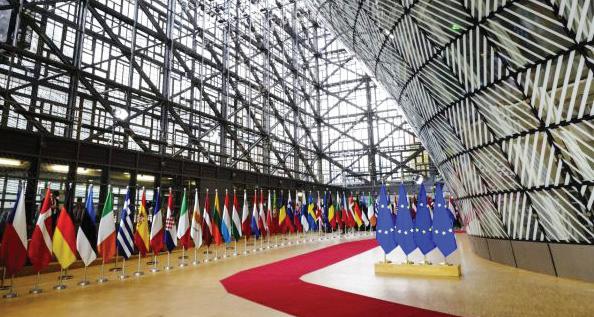
of joining the EU would change the nature of the region, transforming poor, authoritarian and non-consensual states into the kind of prosperous, democratic, law-bound polities where unhappy minorities would be permanently content to live.
On eventual accession, the various Balkan nations, currently divided by regional borders, could be reunited inside a borderless Europe — in effect, this was the Yugoslav solution, recast for the 21st Century.
So, the end of enlargement also marks the end of the West’s game plan for suppressing the region’s frustrated nationalisms, with the logical consequence that the peoples of the region will revive the business of nation state formation, left unfinished in the 1990s. ‘New Cold War’ That is already enough to create a combustible situation in the region. But the end of EU enlargement is also playing out in parallel with another international drama, namely the United States’ decision to fight the “New Cold War” in the Balkans.
The origins of this date back to the crisis in Ukraine in 2013-14, to which Russia responded by trying to block the integration of those states in Eastern Europe which were not already members of NATO, including several in the Balkans.
Its mode of entry into the region’s politics was to back the grievances of local groups which were in conflict with the West, in return for a commitment not to join NATO.
Unsurprisingly, Washington viewed this as a challenge to the stability of its settlement in the Balkans and, after an absence of a few years, returned to the region with the aim of pushing Russia out and finishing the job of integrating the region into NATO.
The first clash came in North Macedonia in 2015, where the then-government became embroiled in a massive corruption scandal, fell out with the West and turned to Russia for support.
A two-year diplomatic battle then ensued at the end of which the US succeeded in ousting the government and replacing it with a pliant administration that prioritized NATO integration.
This was followed by a contest for influence in Montenegro, Russia’s oldest ally, which the Americans pressurised to switch sides and join NATO. They succeeded, but only after a Russian-backed attempt to assassinate the pro-NATO prime minister failed at the last minute.
Kosovo’s legal limbo With North Macedonia and Montenegro secured, the US then turned to the question of Serbia where Russia was firmly entrenched. To neutralise its influence, the US concluded it had to address the issue which bound the Serbs to Russia, namely their anger over what they saw as the illegal confiscation of Kosovo back in 2008.
Since Kosovo’s independence could not realistically be reversed, that meant finding terms for its recognition that satisfied the Serbs, and then persuading Kosovo’s Albanian population to accept them.
The result was a secret deal between the presidents of Serbia and Kosovo to partition the territory, with a small Serb-dominated enclave in the north passing to Serbia in return for Belgrade’s recognition of the Albanian-dominated south. If all went well, Serbia would have no further need for Russia and Kosovo could end its debilitating state of legal limbo.
Unfortunately for Washington, the deal collapsed on contact with the outside world. For one thing, it caused apprehension in many European countries, including Germany and the UK, which feared that moving borders would set a dangerous precedent for the fragile states of Bosnia and North Macedonia. More importantly, the deal also generated a furious backlash in Kosovo whose people had understood the country’s independence within its existing borders was an established fact.
Unsurprisingly, many felt betrayed by the US whose belated message to them was that independence was actually conditional on the blessing of their old adversary, Serbia.
Kosovo’s response was twofold. The prime minister attempted to pressure Serbia into recognising Kosovo unconditionally, by imposing 100 per cent tariffs on Serbian imports and asserting the government’s authority in Kosovo’s northern enclave, leading Serbia to deploy its army to Kosovo’s border earlier this year.
Meanwhile the president, realising that popular opposition to Serbia’s condition precluded a negotiated agreement on recognition, initiated moves to unify Kosovo with the recognised state of Albania.
Where two dramas meet And this is where the two international dramas playing out in the Balkans — the New Cold War and the end of EU integration — meet.
With the failure of its bid to join the EU, Albania now has nothing to lose from pursuing the alternative goal of national unification.
Neither does Serbia which will at some point be compelled to annex the Serb enclave in Kosovo’s north to prevent its incorporation into an Albanian national state.
That in turn will create a generational opportunity for the Serbs of Bosnia to try and break away, offering their territory to Serbia as compensation for the loss of Kosovo.
And a united Albania will create a new geopolitical opportunity for the Albanians of North Macedonia, who will want to attach their territory to this new state.
It remains an open question how violent this process would be, but history suggests it would not be peaceful.
All this will create a headache for the US which has asserted its leading role in the Balkans with the aim of neutralising Russia but will end up responsible for managing this new round of instability.
The probability is it will again have to reorder the Balkans, as it did in the 1990s and 2000s, to accommodate the nationalist forces which the EU has failed to suppress.
Given the predictability of all this, some may wish the EU would simply honour its earlier commitment to integrate the region, starting with an offer today to open membership negotiations with Albania and North Macedonia.
But as realpolitik takes over, the time for wishful thinking has long passed.





